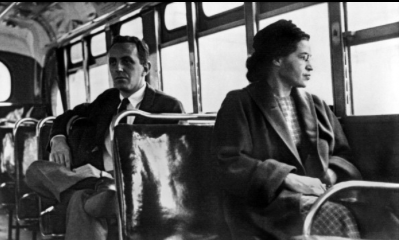60 years ago, in Montgomery, Ala., a 42-year-old African-American woman took a bus ride that would change history. Rosa Louise McCauley Parks became “the first lady of Civil Rights” and “the mother of the freedom movement” after refusing to give up her seat on a bus to a white passenger.
Parks’ act of defiance became an important symbol of the modern Civil Rights Movement, leading to the 381-day Montgomery Bus Boycott and the U.S. Supreme Court ruling that segregation in public places was unconstitutional in Brown v. Board of Education.
A lot has changed in the last 60 years, but many students feel like the fight for equality is still an ongoing battle.
“The social changes that were a result of the Civil Rights Movement were positive, and as someone of mixed race, I feel like the steps society has taken toward equality are very important,” junior Candice Bolden said. “I don’t think there’s as much that needs to improve as there was back then, but I believe there is always room for improvement in race relations, like representation of people of color in the media or assumptions based on race. But unlike back then, more of the issues today are based on ignorance than hatred.”
Senior Molly O’Conner agrees that the social changes that have taken place since the Civil Rights Movement have been positive, but still feels like there is room for improvement.
“I definitely think we still have a long way to go in terms of acceptance,” she said.
Senior Monica Rodriguez believes that the nation should focus on building relationships outside of people’s comfort zone.
Ben Voth, director of debate in SMU’s Corporate Communications and Public Affairs division, has studied the Civil Rights Movement and its activists for years. He believes that the changes that have happened are considerable.
“I think what Rosa Parks did, along with others before her, continued a very positive process of integration,” Voth said. “I hope people will accept and celebrate both the direct success of Rosa Parks and the embodied principals of social change that continue with us today.”
Senior Kasmira Della Schiava, from Milan, Italy, believes that Parks’ powerful action 60 years ago was a key event that led to the change in racial dynamics in the U.S. However, Della Schiava notes that race remains one of the most discussed topics today.
“[This] suggests that while major steps have been made, we haven’t quite reached total equality,” she said. “It’s hard to say what needs to be improved to better the tensions that continue to arise, but ensuring that every member of society receives equal treatment and is given equal opportunities to succeed is essential.”









